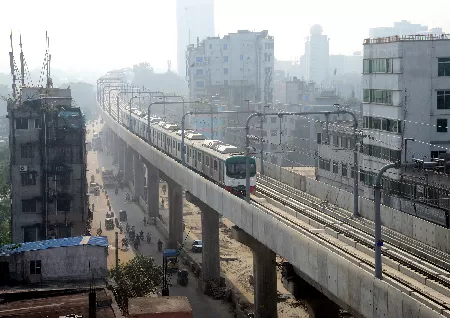One of the world's most congested cities just opened its first metro line

Officials and commuters in Bangladesh hope the country's capital, Dhaka, would benefit from the country's Wednesday debut of its first metro train service, which will help relieve traffic in one of the world's most densely populated and congested cities.
Prime Minister Sheikh Hasina officially opened the Line 6 project, which was largely supported by the Japanese government. She characterised the new railway as a "milestone," according to the Dhaka Tribune. She referred to it as "another jewel in Bangladesh's development crown."
The Dhaka metro, she continued, would greatly lessen traffic bottlenecks in the city and there would also be train cabins just for women.
According to a statement issued by the state-run Dhaka Mass Transit Company Limited, the line, which is over 20 kilometres (approximately 12 miles), would serve 16 stops and, for the time being, connect the northern area of Dhaka to government buildings and hospitals (DMTCL).
The Motijheel financial area in the south is where it would finally cross the city.
The largest city in Bangladesh is Dhaka, where more than 20 million people live. Their everyday aggravation is brought on by the city's congested roadways and traffic congestion.
According to statistics gathered by the World Health Organization, more than 3,000 persons pass away in road accidents in Bangladesh each year. A tragic bus accident in 2018 that resulted in the deaths of two students attracted large groups of disgruntled teenage demonstrators to the scene.
The infrastructure of Dhaka, according to experts, has not kept pace with the city's population growth. They contend that the nation's reliance on automobiles and, until recently, the absence of organised public transportation, only serve to exacerbate the issue.
Every day, Shawana Chowdhury, a first-year student at Bangladesh University, travels for hours in rickshaws, vehicles, and buses. She expressed excitement about "transforming her regular commute."
She said that "a lot of my life is thrown away in traffic." This reform is really crucial for Bangladesh is ,The use of public transportation can alter our life.
The route, which is 20 kilometres (12 miles) long, will include 16 stops and connect Dhaka's northern region to She claimed that the brand-new metro line represented a ray of hope for the citizens of Metro Line
She noted that major global cities with outstandingly developed public transportation systems included Singapore, Japan, and France. "I hope that over time Dhaka would go through its own metamorphosis, with less traffic and the metro becoming the norm."
Related queries to this article
- Bangladesh
- metro line
- Prime Minister Sheikh Hasina
Read more articles and stories on InstaSity Trending Topics.

